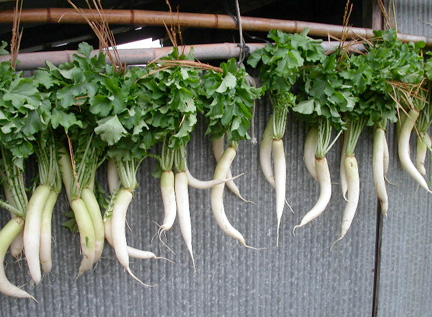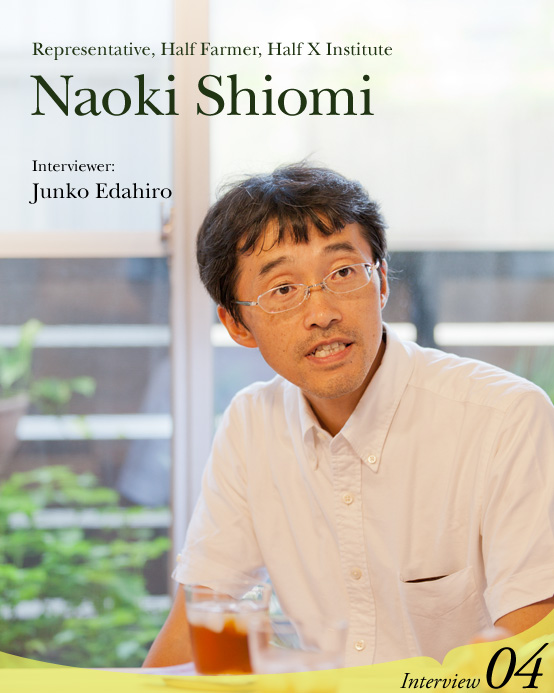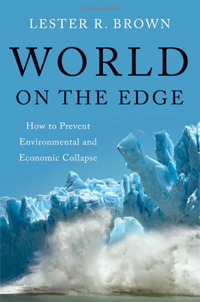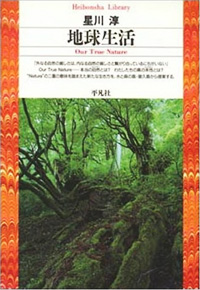- Edahiro:
- Thank you for sharing your time with us today. Could you please start by talking about how you happened upon the concept of "Half Farmer, Half X"?
- Shiomi:
- I was born and raised in a type of "satoyama" environment (Japanese farming village near a hill or a mountain, often self-sustained), which is one of the major influences in my coming to the concept of Half Farmer, Half X. Our family farmed part-time and my father was a school teacher as well. My mother and grandmother grew tea and we shipped out rice too. We used to go out into the rice field with our bento (lunch) boxes to plant rice and harvest. I am the last of a generation that would work in the rice field under the moonlight and go into the mountain with the family to plant trees. There still weren't many trucks then either.
-
Later, when I graduated from university I joined a company named Felissimo (a major mail-order catalog company in Japan), which had started working on environmental issues in the late 1980s. It influenced me greatly, as well. And I started reading Lester Brown's books and listening to his lectures.
As I started reading more, it was inevitable that I began reading books on agriculture. Japan's level of food self-sufficiency had already been low for a while and the rising average age of farmers was becoming a serious concern. But I found it difficult to discuss and address these issues without actually experiencing it, so I came to this conclusion: "I shall plant seeds and use the hoe." There is a big difference between doing something yourself and just telling others, like farmers, or like the people of China, to do their best.
Another big factor that influenced me was the fact that there were many art school grads that joined the company the same year I did. Since the company developed and manufactured its own original merchandise, I met many very creative people and actually felt like I was the only ordinary guy. This is when my delayed search for identity began. I now call this search for who you are the "true calling issue." This and environmental issues were my two main themes during the later years of my twenties.
This was in the 1990s. The Earth Summit took place in 1992, and in 1993 Japan's rice supply crisis erupted. When I turned 30 in 1995, there was the Great Hanshin Earthquake in Kobe and the Sarin Gas Attack in Tokyo. This was a great learning experience in going through my late twenties.
In 1999, 2000, and 2001, during the transition phase into the new millennium, quite a lot of people relocated to rural areas, which made me strongly feel that I too must take action and change.
Continuing to read many books, I came across the term "han-no han-cho" (half farmer, half writer) in (Japanese writer and environmentalist) Jun Hoshikawa's book and knew that this was it.
But, I didn't want to become a writer, nor could I do any translation, or know much about the law, or was good at computers, and soon realized that there was nothing I could use to replace the "writer" part.
In the beginning I put the word "it" into the phrase, so it read 'half farmer, half it,' but one day replaced it with an "X" instead, and that felt right. This birth of a new motto gave me a mission to communicate this lifestyle and concept.
At first I didn't really feel the need to communicate this new concept to anyone. It was more to help myself than anything. And those words really did help me. Later I started getting an unexpected boost, and began getting featured in magazines and newspapers, and then was asked if I wanted to put out a book. The concept seems to have a long life, maybe because it came to be after many wrong turns and lots of pondering.
It took 10 years to come and speak in Tokyo. I really don't feel any special need to present in Tokyo, but I am getting more requests to speak throughout the year from Tokyo. Which makes me think that the age we're living in is getting more and more difficult.
- Edahiro:
- People seem to feel that something has to be done about the low level of food self-sufficiency in Japan, but at the same time they place themselves outside of the system and wait for the government to do something about it, or for the farmers to make the effort, standing on the audience side cheering as the consumer. What you want to do is change things from within, not from outside, right?
- Shiomi:
- Yes. I think that being a Half Farmer, Half X is doable in Tokyo, New York, or Berlin. There are some people who say that "we should limit being a Half Farmer, Half X to people living in rural areas," but this will only result in the same structure of the city versus the suburbs, by which we are so burdened.
- Rather, people should do what they can, be it balcony gardening or rooftop gardening, in places they love. Setting loose rules, such as committing 30 or 40 minutes a day to handling soil and plants will enable more people to start farming more easily. I think many people feel that starting farming is too much of a challenge, so how low you can set the bar is the key. Some people will choose to go deeper, or some may choose to just spread the word. We can all play different roles.
- Edahiro:
- When you finally decided to plant seeds and use the hoe, was it not a drastic change for you? For example, I'm sure you've questioned whether you as one individual could do anything to change Japan's level of self-sufficiency. I think that your experience in farming as you were growing up had some significance.
- Shiomi:
- You're right.
- Edahiro:
- I think crossing the line (from non-farmer to farmer) is difficult for a lot of people.
- Shiomi:
- What I thought of first is that it is important to raise the level of self-sufficiency of the food on our table even by just a factor of 0.001. Our generation will raise it to 0.1, the next generation to 0.2, and so forth. Our generation may feel that we have come so far into this very dangerous state and may feel powerless, but I think the idea of passing the baton from one generation to the next is also acceptable.
- I think that most people can't take that first big step to become a half-farmer, but I think any first step is an important one, so I recommend starting with something easy, like renting a space in a community garden, or going to visit an uncle on the farm during the summer holidays to help out, or going to a friend's place. I think the accumulation of those little actions is what's important.

( Photograph: Naoki Shiomi )









